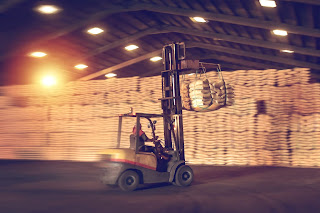FORKLIFTS OF SIGNIFICANT TYPES USED IN WAREHOUSES
Without forklifts, the warehouse and logistics sectors are lacking. In warehouses, forklifts are frequently utilised to load and unload cargo. Typically, warehouses are used to store raw materials, packing materials, spare parts, components, and commodities from manufacturing companies, agricultural enterprises, etc. Forklifts play a significant part in moving logistics at the warehouse in this situation. They are used to load and unload cargo from vehicles, such as trucks, trains, planes, and ships.
Forklifts' importance in material handling:
One of the most common forms of warehouse necessities is the forklift. Forklifts are used in warehouses to transport heavy cargo loads. These forklifts allow operators to move heavy loads throughout the facility with ease. Based on a variety of characteristics, there are many various types of forklifts on the market, and each one is wonderful in its own way. According to their energy source, forklifts can be divided into three categories: diesel forklifts, electric forklifts, and LPG forklifts. Let's examine each type's specifics in more detail.
Major forklift models available:
Conventional and economical diesel forklift
The biggest kind of forklift is a diesel model. These are best used outside, particularly on rocky terrain. In general, a new diesel forklift truck is far less expensive than an electric one. Diesel engines provide far more torque than electric or propane engines, which enables the forklifts to do more demanding tasks including lifting heavier loads, ascending steeper slopes, and accelerating more quickly.
Diesel engines often require less maintenance than propane or electric engines because of their endurance and durability. Comparing these forklifts to electric and LPG forklifts, they have the greatest lifespan. They therefore show to be cost-effective over time. Compared to electric or gas forklifts, these forklifts frequently sell for more money.
Diesel forklifts have several benefits, but they also have some drawbacks. Despite the fact that diesel engines need less maintenance than electric forklifts, the cost is far higher. Additionally, because it is a diesel-powered device, it emits a lot of carbon dioxide, damaging the environment. It is the least environmentally friendly forklift among the three. Furthermore, they operate with a lot of noise.
The Electric Forklift of the Future Electric forklift trucks don't have gas tanks; they just use rechargeable batteries. They are frequently the smallest type of forklifts, and inside application is where they perform best. Electric forklifts don't use conventional fuel, therefore they don't have to pay for refuelling like diesel or propane do. These forklift trucks are the quietest of the three varieties since there is no fuel burning, which results in significantly lower noise levels. Since they don't need fuel storage, electric forklifts are smaller and more compact than their counterparts. They are therefore easier to turn and manoeuvre, especially in small, limited spaces. Electric forklift trucks emit no carbon dioxide because they don't use fossil fuels. As a result, they are more environmentally friendly than propane or diesel. Therefore, choosing between an electric and a gas forklift is straightforward if you value ecologically friendly equipment. Due to the simplicity of their mechanics, electric engines are less expensive to run and repair than diesel or propane engines.
Electric forklifts have the highest initial cost of the three types, despite the potential long-term savings on fuel. Unfortunately, drastically less torque results from saving gasoline. Additionally, recharging an electric battery requires a lot of time.
Best of Both Worlds with LPG
LPG forklift trucks are propane-powered vehicles. They are almost halfway between diesel and electric forklifts in terms of size, and the same is true of their ideal working conditions. They can be utilised both inside and outside. Since they can operate for the longest time on a given amount of fuel, LPG forklifts are the most efficient. On a single tank, they can frequently work an entire shift. Although LPG forklift truck torque is much higher than electric, it is not as high as diesel. LPG trucks generate significantly fewer pollutants than diesel trucks, making them more environmentally friendly even though they aren't as sustainable as electric forklifts. Here are several disadvantages of these forklifts, though. LPG forklifts have the lowest sticker prices, but despite this, their long-term ownership costs are higher than either diesel or electric forklifts. Due to the space occupied by the fuel tank on the back of the vehicle, propane forklifts have a low rear vision, making them challenging to manoeuvre.

Comments
Post a Comment